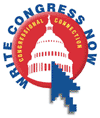Member Pipeline - Legislative - Congressional Contact Tips
- Tips on Contacting a Member of Congress
- Capitol Hill Meetings - What to Expect
- Critical "Dos & Don'ts"
Tips on Contacting a Member of Congress
1. Writing a Letter
- Clear - Do not be overly technical
- Concise - Be specific and succinct in your message
- Bring the issue "home" - Relate clean water issues to your home district
- Remember to use AMSA's Congressional Connection
2. Contact
- Members of Congress and Administration
- Key Congressional and Administration Staff
3. Form of Delivery
- Letters - Include pertinent information
- Phone calls
- Identify yourself as a constituent
- Be concise
- Meetings with your Representative
- In Washington, DC
- At home
- Time your letter for maximum impact - watch AMSA's Alerts and Updates
4. Meeting
- Plan an agenda - Know what you want to accomplish at your meeting
- Stick to your agenda
- Appoint a leader to speak on behalf or your group
- Keep the meeting moving
- Ask for action
- Be alert to "non-answer"
5. Follow Up
- Restate the issue in a thank-you letter following contact with a Member or Staff
- Accountability
- Check to see if action is taken or promise is kept
- Stay on top of priority issues - stay informed with AMSA's Alerts and Updates
- Share information with other public officials and Congressional Representatives
- Communicate thanks or disappointment
[top]
Capitol Hill Meetings - What to Expect
- Meetings on Capitol Hill can - and will - take place anywhere; in a Senator or Member's office, in a Committee hearing room, in the hall or in the reception area. Don't be surprised.
- Expect interruptions, tardiness, canceled, and rescheduled visits. Expect mistakes in schedules, bells ringing, and early departures.
- Anticipate changes in whom you meet.
- Visits should be planned with sufficient time to account for late meetings, to allow time to get from one place to another, etc., so expect down time between meetings.
- Senators and Members have many demands on their time and schedules -- your priorities may not be their #1 interest.
- Your presentation should be planned to last 15 minutes.
- Make your most important points clearly, succinctly, and specifically.
- Be honest, candid, and relaxed; use a conversational tone in your presentation - don't be defensive or argumentative.
- Expect a neutral reaction -- Senators, Members and staff are seldom in a position to make a firm commitment: a favorable response is a commitment to "do the best possible"; a more likely response is agreement to consider the proposal.
[top]
General
- Do express appreciation to the person you are visiting for the time spent and the opportunity to meet.
- Do take the time to know who you are talking to, what they do and what their concerns and priorities might be.
- Do know the reason for your visit and couch your presentation in those terms.
- Do be prepared and equipped to state the reason for your visit; if you want an action taken, describe what action should be taken and when, to or for whom, and why.
- Do focus your presentation on issues you know well.
- Don't be surprised by lack of interest or a negative reaction.
- Don't respond or be argumentative to a negative reaction.
AMSA Specific
- Do be aware if your representative is a member of a key Congressional Committee or the Water Infrastructure Caucus (WIC).
- Do emphasize your support for the legislation and communicate to your representative the significant environmental improvements that have and/or will take place.
- Do emphasize your unique perspective as an environmental practitioner. Only you can provide firsthand knowledge and expertise "from the trenches".
- Do emphasize regional and local implementation of broad federal water quality goals as an approach that will allow unique geographic programs to be addressed in a manner that provides maximum environmental benefits.
- Do support control of pollution using a comprehensive watershed management approach in which contributions of pollutants from all sources can be measured and the most cost-effective measures employed to reduce pollutants to a level where receiving water standards are met.
- Don't suggest that POTWs have done their share and should be left alone. Instead, explain that while POTW control measures should continue, point source discharges are becoming an ever decreasing percentage of total pollutant loadings to the Nation's waters, thus the need for the comprehensive watershed approach.
- Do support substantial increases in federal funding opportunities.
- Do suggest that enforceable nonpoint source controls are needed to achieve real watershed improvement.
- Do offer the experience and expertise of your agency and the AMSA National Office as a technical resource.
[top]




